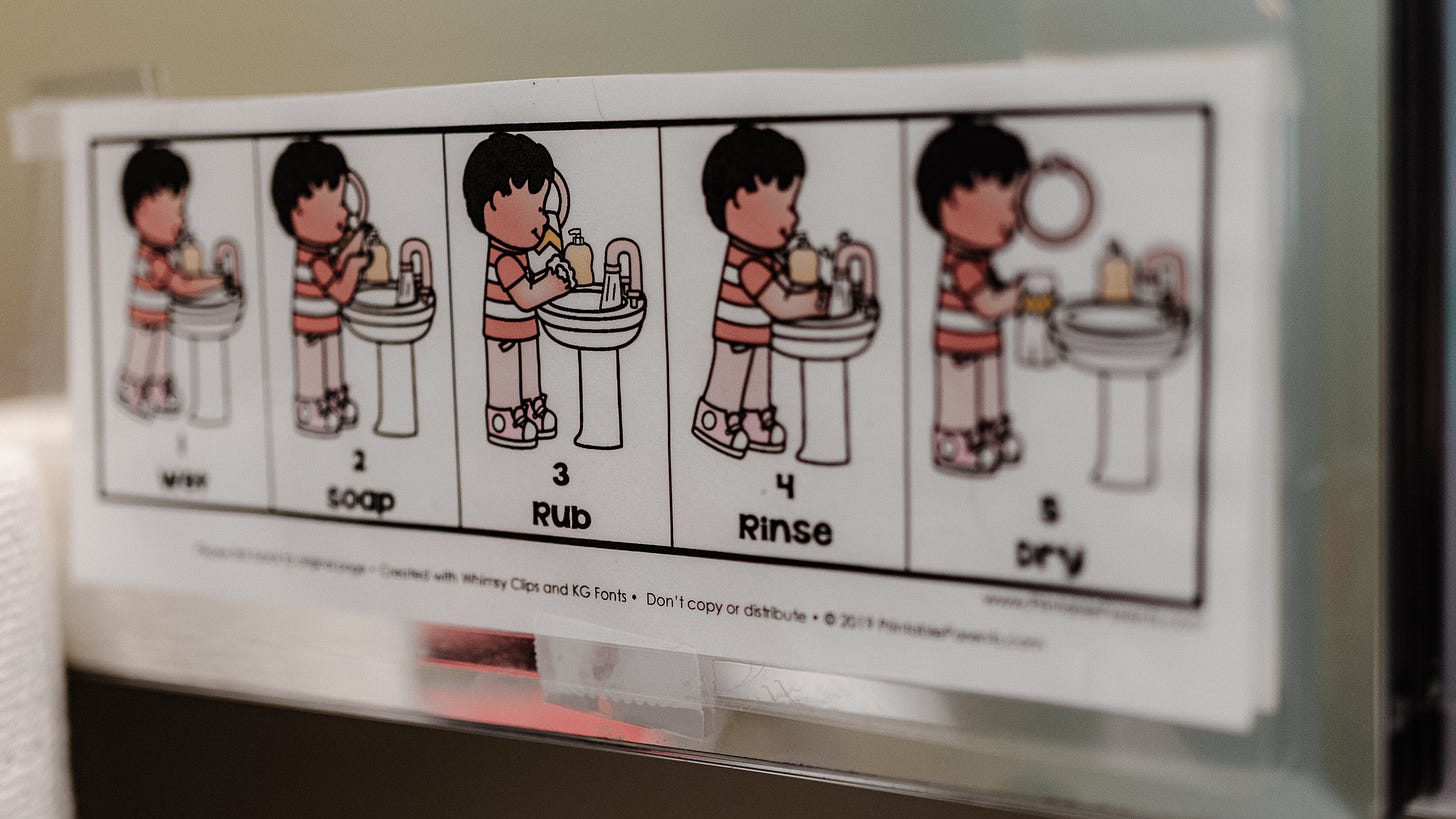“As the rest of the U.S. comes to terms with the same restless impermanence, it must abandon the question When do we go back to normal? That outlook ignores the immense disparities in what different Americans experience as normal. It wastes the rare opportunity to reimagine what a fairer and less vulnerable society might look like.” — Ed Young, staff writer for The Atlantic

As the nation seems poised — yet again — on the edge of easing most COVID-19 restrictions, I’d like to pause and ask everyone not to forget what they’ve learned over the last two years.
The pandemic experience shared many features with how families with disabled loved ones lived already. And it sucked.
“The disability community has also noted that, at a time when their health is in jeopardy and their value is in question, abled people are struggling with a new normal that is their old normal—spatial confinement, unpredictable futures, social distance,” wrote Ed Young in The Atlantic, published April 2020. Young continues:
“We know how to do community from afar, and how to organize from bed,” said Ashley Shew of Virginia Tech, who studies the intersection between technology and disability. “Instead of feeling this great vacuum, our social life hasn’t radically changed.” Disability scholars have written about “crip time”—a flexible attitude toward timekeeping that comes from uncertainty. “Everything I enter in my calendar has an asterisk in my mind,” Shew said. “Maybe it’ll happen, maybe it won’t, depending on my next cancer scan or what’s happening in my body. I already live in this world when I’m measuring in shorter increments, when my future has always been planned differently.”
When nearly everyone is confronted with a health catastrophe (albeit temporarily) the problems are obvious: the medical system is failing its patients by being too profit-driven, the government is failing by having too much red tape, schools are failing by being too inflexible.
When nearly everyone has less privilege than they are used to, the solutions are equally obvious: Give everyone money so they can sort out their own problems, as Congress did with multiple stimulus packages. Eliminate red tape, as the Republican and Democratic administrations both did with multiple public health emergency declarations. Adapt education to each learner, as thoughtful teachers and school staff did practically overnight.
In short, give people the tools and trust to be self-reliant.
A friend — a woman of color and small business owner — took to Facebook early in the pandemic to complain about her third useless call that day to a government office for help and the meetings she had attended with no relief in sight.
“NO small business support set up in 3 months. PLEASE SOMEONE EXPLAIN THE DAMN PRIORITY TO ME. IS THIS ANOTHER DAMN DAY IN PARADISE? This is people’s money, so use it for what they need, not what you think about their needs. Is this much anger even healthy?” she wrote.
I hear a lot of echoes of her complaints in the struggles my fellow medical mamas experience regularly. And when the systems fail us, it is not a business that collapses, but a family. Consider this article from Canada about a family that was considering surrendering their child to the state in mid-2020.
"I am emotionally exploited for taking care of my medically complex child," [Klara] Cramer said. "It's only my inner guilt at being a parent that stops me from saying I'm done. Here is my child. I'm surrendering him to the state and I'm walking away because I'm done."
She isn't alone.
According to Angela Clancy, executive director of the Family Support Institute of B.C., parents at their breaking point are considering making the same decision.
"One of the most traumatizing things a family could ever go through is to be pushed to the edge where, because of lack of services and support, they need to surrender their child to the care of the ministry.
"And when that happens, all services and support, including financial resources, are given to someone else to do exactly what you could and should be doing as a parent," Clancy said.
"It's an archaic system. It's an unacceptable system, and families are facing this all the time in British Columbia."
It’s crazy to me that this story plays out over and over again in jurisdictions around the world.
So, no. I do not want to go back to normal. I want us to take this collective trauma and move forward, to better.
Note to readers new and old: I also wrote about this topic in November of 2021. Check out that post for even more thoughts and research on this subject.
Medical Motherhood’s news round up
Snippets of news and opinion from outlets around the world.
• From Disability Scoop: “CDC Adds IDD To List Of Conditions At Increased Risk From COVID-19”
Nearly two years into the pandemic, the Centers for Disease Control and Prevention is for the first time acknowledging that people with intellectual and developmental disabilities have an elevated risk of severe disease from COVID-19.
The agency quietly updated its list of medical conditions known to be associated with a heightened chance of severe illness from the virus in mid-February.
The list includes people with intellectual and developmental disabilities, birth defects, cerebral palsy, Down syndrome, attention-deficit hyperactivity disorder, learning disabilities, spinal cord injuries and “people with any type of disability that makes it more difficult to do certain activities or interact with the world around them, including people who need help with self-care or daily activities.”
Individuals with conditions on the CDC list are “more likely to get very sick with COVID-19,” according to the guidance. That could mean being hospitalized, needing intensive care, requiring a ventilator or death.
• From AP News: “Disabled orphans fleeing Kyiv received by Poles, Hungarians”
ZAHONY, Hungary (AP) — Some of Ukraine’s most vulnerable citizens have reached safety in Poland through an effort of solidarity and compassion that transcended borders and raised a powerful counterpoint to war.
On Wednesday, a train pulled into the station in Zahony, Hungary carrying about 200 people with severe physical and mental disabilities — residents of two orphanages for the disabled in Ukraine’s capital of Kyiv that were evacuated as Russian forces battered the city.
• From The Atlanta-Journal Constitution: “Christian nonprofit accused of abusing special needs children in its care”
On Wednesday, authorities arrested David Fahey, 62, at his property in Johnson County and charged him with four counts of felony cruelty to children and three counts of felony false imprisonment. According to a sheriff’s office official, Fahey is accused of restraining a teenager with handcuffs and beating him with a belt, a curtain rod and a wooden rod. He was booked into jail wearing a QAnon T-shirt.
[…]With Fahey jailed on Thursday morning, his biological son, Logan Fahey, had been left to care for the remaining adults. Two have genetic disorders, all four are in diapers and none can walk on their own.
“I don’t condone anything illegal, but I don’t believe my dad did anything illegal,” said Logan Fahey, who is a captain with the Wrightsville Police Department. “I think my dad is a good-hearted man.”
[…]This wasn’t the first time such allegations of abuse had been levied against the Faheys by a child who ran away.
In 2014, a boy and a girl, both 16, were picked up in an adjoining county and told police horrific tales of abuse at the farm, according to a sheriff’s office incident report.
Medical Motherhood is a weekly newsletter examining the policies and practices in raising disabled children.
Get it delivered to your inbox each Sunday morning or give a gift subscription. Subscriptions are free, with optional tiers of support. Thank you to our paid subscribers!
Follow Medical Motherhood on Facebook, Twitter, TikTok, Spotify, Apple Podcasts, or Instagram or, visit the Medical Motherhood merchandise store to get a T-shirt or mug proclaiming your status as a “medical mama” or “medical papa.”
Do you have a question about raising disabled kids that no one seems to be able to answer? Ask me and it may become a future issue.
















'Normal' sucked for people like us. Let's not go back, let's go forward